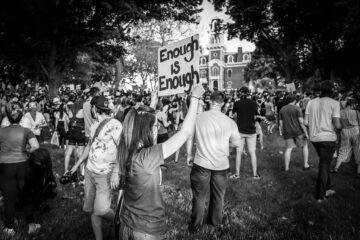David A. Sklansky in the Politics and Rights Review:
 Shortly after the recent election, the New York Times reported the results of a new study documenting a deep and pervasive pessimism among the American public, cutting across ideological lines. Only a quarter of Americans think the country’s best days are ahead, only one in ten thinks the government represents them well. This is broadly true both of Trump supporters and of the half of the country that voted against him. “In a sense,” the report concludes, “it is in the deep chords of distrust where Americans seem most united.”
Shortly after the recent election, the New York Times reported the results of a new study documenting a deep and pervasive pessimism among the American public, cutting across ideological lines. Only a quarter of Americans think the country’s best days are ahead, only one in ten thinks the government represents them well. This is broadly true both of Trump supporters and of the half of the country that voted against him. “In a sense,” the report concludes, “it is in the deep chords of distrust where Americans seem most united.”
Serge Schmemann, the Times editorial board member who wrote about the study, lamented that it “left unanswered the wrenching question that we must answer if things are to improve: Why? Why has America fallen into the deep malaise quantified by this study? Why are we so down on our country, our government, our prospects? Why is there so much hatred in our civil discourse?”
I offer a partial answer in my new book, Criminal Justice in Divided America: Police, Punishment, and the Future of Our Democracy. Failures of the criminal legal system helped to drive American politics toward populism, polarization, and pessimism. By the same token, the right kinds of reforms can not only make policing, prosecution, and punishment fairer and more effective; they can assist in rebuilding American democracy.
More here.
Enjoying the content on 3QD? Help keep us going by donating now.
